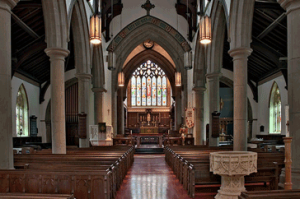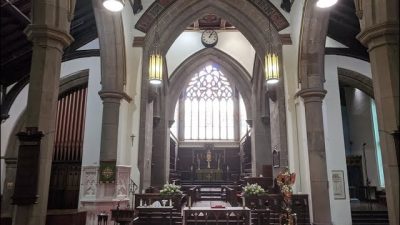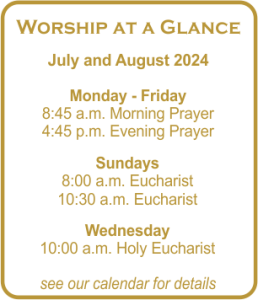This is my commandment, that you love one another as I have loved you ... John 15:12
The words of the gospel on the Sixth Sunday of Easter (Year B) finish up what was begun a week ago. You might remember that Jesus was on about vines and branches, abiding, pruning and fruit-bearing. All were images he used to help the disciple see their relationships in concrete ways. He was illustrating how they were to continue to abide with him ... even after they would no longer be able to see him, and how they were to treat one another (“... they will know we are Christians by our love, by our love”). And a week before that, Jesus compared the shepherd who loves the sheep to the hired hand who high tails it out of there at the first sign of trouble.

Someone once said it’s impossible to see clearly with much understanding until you can see from 20,000 feet. That is to say, so often our perspective is encumbered with so much intricacy, that it’s limited in all sorts of complicated ways. Our self-interest is most often in the way of our perception. Unless we can see the way whatever might be happening right under our nose impacts us personally and directly, regardless of its import, we don’t really pay very much attention at all.
I’ve been slowly making my way around to Cathedral groups to gently suggest, recommend, (sometimes beg) that we give attention to acquiring the training prescribed under the Safe Church protocols the Anglican Church has been working to implement for over a decade. What’s interesting is, that most of us, when the suggestion is first made, can’t seem to see how it has anything to do with them. We either have a ridiculously narrow concept of what being safe in the church means, we can’t see how it could be of any benefit to us personally, we’re 100% certain that we’re guilty of nothing, or we can’t imagine how we could be part of making Christ Church Cathedral a place where everyone feels safe. That’s funny, since you and I are Christ Church Cathedral. Most eyebrows go up when there’s suggestion that safe church protocols have little, if anything to do with clergy abusing children. It could but it thoroughly misses the point.
But I digress. While we’re so busy musing over the stupidity of 2000-year-old disciples, from where hindsight is 20/20, maybe from 20,000 feet on a cloudless day, we still surprisingly often just don’t get it. Jesus uses simple, straightforward, concrete illustrations to make certain he is understood. The logic he uses is not complicated. Still, what he has to say is a foreign language to us. The reality out of which Jesus speaks is not our reality. – Exactly! It’s not our reality. And that’s our problem.
... it’s important that we all do something right
Why is this even important to us? Because the way we live now is a mirror of the way we will live in eternity. The way we acquire assurance of where we will be is by the way we are now. “Abide in me ... bear fruit, fruit that will last.” St. Paul said “we look as in a mirror dimly, then we will see face to face ... there is “a more excellent way,” he said. And that way is love. And Paul did not spare the specifics:
“Love is patient; love is kind; love is not envious or boastful or arrogant or rude. It does not insist on its own way; it is not irritable or resentful; it does not rejoice in wrongdoing, but rejoices in the truth. It bears all things, believes all things, hopes all things, endures all things. Love never ends.”

Why are prisons full? Why are there homeless people on the streets? Why does law enforcement receive crisis calls at all times of the day and night about domestic violence. This is, unfortunately, not the mirror of eternity. This is not the world God would have it be. “This is my commandment, that you love one another as I have loved you ...” As a human race, as Canadians, New Brunswickers, Frederictonians, and as citizens, I’m afraid we still just don’t get it.
Learning how to love is our homework and it never ends. We can always do it better. Learning about safe church protocols is for my own good and yours. Not because you’ve done something wrong but because it’s important that we all do something right. It’s because we care about the community – the family to which we belong and of which we want to actively a part. It's important to be assured that we’re all aware of what makes this place as safe as it can be.
GMH
03 May 2024






















Recent Comments